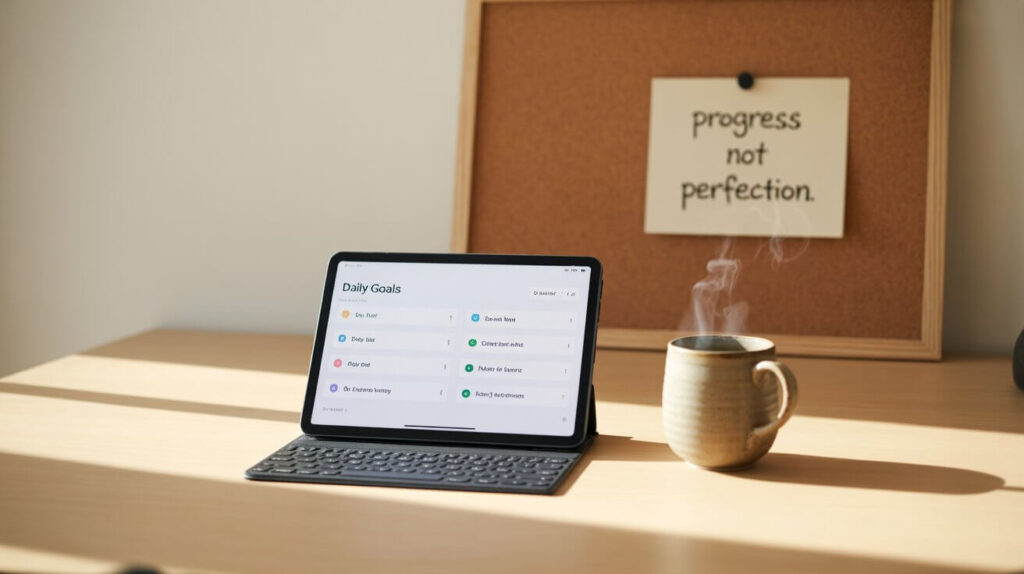So here’s the truth: setting goals isn’t the hard part. What really messes with us? Daily habits for goal success, the boring, repeat-every-day part. You start off strong, full of energy and plans. “I’m getting healthy.” “I’m finally writing that ebook.” And for a few days, you’re on fire. Focused. Motivated. Ready to change everything. But then? Life kicks in.
But then… life shows up.
Emails, messages, errands, meetings, that random YouTube rabbit hole, and boom, it’s Thursday, and you haven’t done a thing toward your goal. Ugh. We’ve all been there. That’s why this article isn’t just about “motivating you to try harder.” That’s not the point.
The point is this: The people who actually reach their goals? They’ve built systems. Little daily things that keep the momentum going, even when the spark fades. They don’t feel motivated every day. They just have tools that keep them aligned.
We’re gonna break this down into two things:
- First, how to build habits that stick (and feel natural),
- Then, how to stay focused daily without burning out.
Also, I’ll share a few tools I’ve tested that made a difference, things like habit tracker apps and AI scheduling tools. (Spoiler: They’re smarter than I expected.)
Let’s go.
Why daily execution is the bridge between goals and results
You probably already know this deep down, but I’ll say it anyway, dreaming is easy. Execution is where people either rise… or loop endlessly in frustration.
And the thing is, most of us don’t struggle because our goals are unrealistic. It’s because we’re trying to muscle through every day without support.
You wake up and think, “I hope I stay focused today.” But that’s not a plan, that’s a wish.
You need small actions baked into your day. Not just reminders. Rituals. Patterns. Systems that don’t require constant decision-making.
Think of it like this: Every time you reach for your phone in the morning, you’re either feeding distraction or reinforcing direction. One tiny choice at a time. That’s where daily habits shine, they automate the good stuff.
And no, it doesn’t have to be some intense, optimized schedule. Even simple things like:
- Reviewing your goal journal with coffee
- Blocking one hour for your top task
- Checking off a habit in a tracker like this one.
That stuff compounds. It’s like brushing your teeth for your goals, small, quick, but non-negotiable. And look, I’m not perfect at this either. I’ve had days where I’ve ignored all my tools, binged Netflix, and told myself “I’ll start again tomorrow.” But when I do stick to my little routine? I feel lighter. Sharper. Like I’m actually becoming the person I imagined when I set the goal.
So yeah, goals are exciting. But daily habits? They’re the real magic.
The daily habits for goal success : Building habits that stick
Let’s be real for a second: Building habits sounds amazing… until you actually try doing it every day.

You start full of motivation, “I’m gonna wake up at 6 a.m. and go for a run and meditate and drink lemon water.” Yeah. That lasts about three days (if you’re lucky), and then real life taps you on the shoulder.
But here’s the thing nobody really tells you, it’s not about being perfect. Or even consistent every single day. It’s about making the habit so small, so doable, and so you, that skipping it feels weird.
That’s how it becomes part of your identity.
The simple science behind sticky habits
Okay, quick nerdy moment (but in plain English).
Habits form through a loop:
- Cue: Something reminds your brain, “Hey, do the thing.”
- Routine: You do it. Even if it’s small.
- Reward: You feel something good, even just a tiny spark.
That loop, done repeatedly, becomes automatic. Like brushing your teeth. You don’t think about it, you just do it. That’s the goal.
The mistake? People start too big. They try to go from zero to hero in a week. But actually, starting embarrassingly small is the trick.
- Want to journal daily? Start by writing one sentence.
- Want to build a morning routine? Just get up 10 minutes earlier, not an hour.
Consistency beats intensity.
And if you need help making it feel fun and trackable, try a visual habit app like Habitify or Streaks. They make the boring stuff feel good. Seriously. You get little dopamine hits for sticking to your streaks, and they integrate with your phone’s reminders or Apple Health. Easy.
Why Habitify and Streaks work (Affiliate Tip)
Honestly? I used to hate habit trackers. They felt like another thing to manage. But then I tried Habitify, and it was different.
Super clean UI. No unnecessary fluff. You can group habits by category (health, work, mindset…), set reminders, and see your streaks grow. Feels good to check stuff off.
Streaks is another solid option, especially if you’re deep in the Apple ecosystem, it integrates with Apple Health and has this fun, gamified vibe.
Bottom line? These apps make the boring stuff feel rewarding.
Staying focused with daily task systems
So… let’s talk about focus.
You ever sit down at your desk with big plans, and somehow end up 30 minutes deep into a Reddit thread about ancient civilizations or watching a squirrel-themed cooking video on TikTok?
Yeah. Same.
The truth is, most of us don’t have a focus problem, we have a system problem. We expect our brains to run on pure willpower in a world full of dings, tabs, pings, and shiny things.
And spoiler: willpower runs out fast. But systems? Systems have your back even when you’re tired, distracted, or not “in the mood.”
Why most of us lose focus (and how to stop)
Let’s break it down.
Focus fails for a few big reasons:
- Too many choices. You sit down and ask, “What should I do first?” And then… nothing.
- No clear priorities. Everything feels urgent, so you bounce between tasks.
- Interruptions. Notifications, emails, messages, all designed to hijack your brain.
But here’s the shift: instead of fighting distractions after they happen, you block them before they can.
That’s where time blocking and smart planning tools come in.
Time blocking, MITs, and giving your brain space
Here’s what I started doing (and no, I didn’t get it perfect from day one):

- Time blocking: I map out my day in chunks. Not rigid schedules, but windows. “Deep work from 10 to 12.” “Admin from 2 to 3.” That kind of thing.
- MITs (Most Important Tasks): Every morning, I write down 1 to 3 things that actually move the needle. If I get just those done, I count it as a win.
- White space: I used to pack my day back-to-back. Now, I leave buffer zones. Little 15-minute breathers. It helps a LOT.
Still struggling to make it stick? That’s where tools like Sunsama come in. It’s not just a to-do list, it’s a daily planning companion.
Sunsama helps you pull tasks from Notion, Trello, your calendar, and more… and guides you to plan realistically. You end each day knowing what mattered most actually got done.
Meet your new focus buddies, Motion and Reclaim.ai (Affiliate)
Okay, not gonna lie, I was skeptical at first. But these tools? Total game changers.
Motion is like a smart assistant that schedules your tasks around your meetings, your energy levels, and even your last-minute changes. It basically takes your to-do list and turns it into a realistic calendar.
Reclaim.ai does something similar but focuses more on work-life balance. You tell it your priorities, work, workouts, deep focus, and it auto-blocks your calendar in a really thoughtful way.
Here’s what I love about both:
- No more decision fatigue
- You see where your time goes
- They adapt when life throws curveballs
And bonus? You can integrate them with Google Calendar, Notion, or whatever else you use.
Affiliate tip: If you’re constantly overwhelmed, just try one. Motion gives you a trial to see if it fits your style. Reclaim.ai too. You don’t need to do more, just need better tools.
When habits meet systems, momentum is born
Here’s the deal.
- You don’t need to hustle harder.
- You don’t need more motivation.
- You need small habits that feel natural…
And smart systems that take the pressure off your brain. That’s it.
That’s the combo. That’s the shift from “I’ll try again Monday” to “I already did it today.”

So don’t overthink it. Pick one habit. Try one new tool, maybe this one, or this one. Let it grow.
And hey, if you made it this far? You’re already way ahead. Let’s go.


